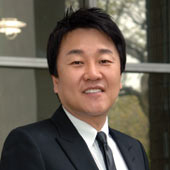More than any retailer, Don Chang has his fingers on the pulses of young women addicted to trendy clothes at perennially-popular prices. Since its humble origin in 1984 as a 750-square-foot store Chang’s Forever 21 chain has mushroomed into 400 franchised stores around the world, and the company is valued at well over $2 billion. Chang and his wife Jin Sook — his co-founder — are personally worth over $1 billion. The Changs inspire by proving that the American dream is very much alive for all who work hard, think big, sacrifice and keep the faith.
Dong-won (“Don”) Chang’s entrepreneurial instincts were honed in his native Seoul, Korea. Three years before coming to California, Chang opened the city’s first coffee and natural juice delivery service in the fashionable Myungdong district. Don and Jin Sook immigrated to the United States in 1981. Don worked three jobs simultaneously: served coffee and pumped gas by day and worked as a janitor by night.
Don Chang credits the gas station job with inspiring his move into fashion. “I noticed that the merchants had the best cars,” he says and decided to turn his customers into competitors. In 1984 Chang struck deals with local Korean garment factories and opened their first retail store, Fashion 21, in the low-rent area of Highland Park between Los Angeles and Pasadena.
The booming music and bright lights that are now a Forever 21 trademark were there from the start. Jin Sook filled the tiny store with minis and tube tops. The formula proved irresistable to its youthful clientele. Within a year sales grew from $35,000 to $700,000. Jin Sook remains the chain’s very hands-on chief merchandiser, still personally picking out fabrics and designs for the Forever 21 fashion lines.
The rapid growth of Fashion 21’s customer base of trend-hungry teens prompted the Changs to franchise their business under the name Forever 21. It was not until 1995 that the second store opened in Miami’s Mall of the Americas. Six years later Forever 21 had spread to 100 locations. As of early 2010 there were over 400 stores worldwide, including in Japan, Korea, China, Thailand, England, France and the Middle East.
Starting from minis and tube tops, the Changs added increasingly sophisticated styles to age their target clientele from teens to young adults. Today Forever 21’s major appeal lies in its quick-turnover buy-it-now-or-never-see it-again ethic. The chain has become notorious for stocking stores with irresistibly-priced runway knockoffs even before the originals hit the retail racks.
The likes of Anna Sui, Diane von Furstenberg and Gwen Stefani’s Harajuku Lovers have filed over 50 federal copyright infringement and unfair competition suits over the past several years. Such suits against Forever 21 tend to end quietly with undisclosed settlement terms.
But these hiccups have done little to slow Forever 21’s success. The company enjoyed sales of $1.7 billion and a net income of $135 million for the fiscal year that ended February 2009, according to a Forbes.com estimate. While others are reeling from the recession, Forever 21 is pushing ahead with new plans for adding merchandise categories like home goods, swimwear and a junior’s plus-size collection. Last year it even paid $2.2 mil. for 13 locations from the bankrupt Mervyn’s department-store chain for $2.2 million to serve as new Forever 21 locations.
“We have always grown at a rapid pace because that is one of the challenges I set for myself,” says Chang. “We hope to keep up the pace of growth in the future.”
Former Forever 21 factory workers say the fast growth has been powered in part by a sweatshop culture. In September 2001 19 employees sued for unpaid wages, mandatory unpaid overtime, 12-15 hour days and compulsory weekend shifts. In March 2004 an undisclosed settlement was announced.
The source of the Changs’ unshakeable faith is no secret. On the bottom of every Forever 21 shopping bag is John 3:16, a popular bible passage that reads, “For God so loved the world, that he gave his only begotten Son, that whosoever believeth in him should not perish, but have everlasting life.” Jin Sook Chang is known to attend church every morning at five.
“People join their church just to get close to them,” a garment district insider says of the Changs. Mrs. Chang is known to “pluck” young designers out of the companies she’s working with, “and if they’re Christian and religious, she puts them in business,” he explains. And for some, it seems to have been a true blessing. Rowena Rodriguez, a mid-thirties fashion consultant and one-time “unbeliever” was born again with Mrs. Chang’s help. “In the short time I worked with Mrs. Chang, my life was transformed, and I accepted Jesus Christ as my Lord and Savior.” When asked the secret to the Changs’ success, Rodriguez exclaims: “The Changs love Jesus!”
The Changs attribute their success to a lot of hard work and a frugal corporate culture. A high degree of personal privacy may be one more condition. While Forever 21 courts hype, the family is determinedly low-key. The internet turns up very few photos on the couple. The Changs live with their two daughters, Linda and Esther, who attend church with them every Sunday.


